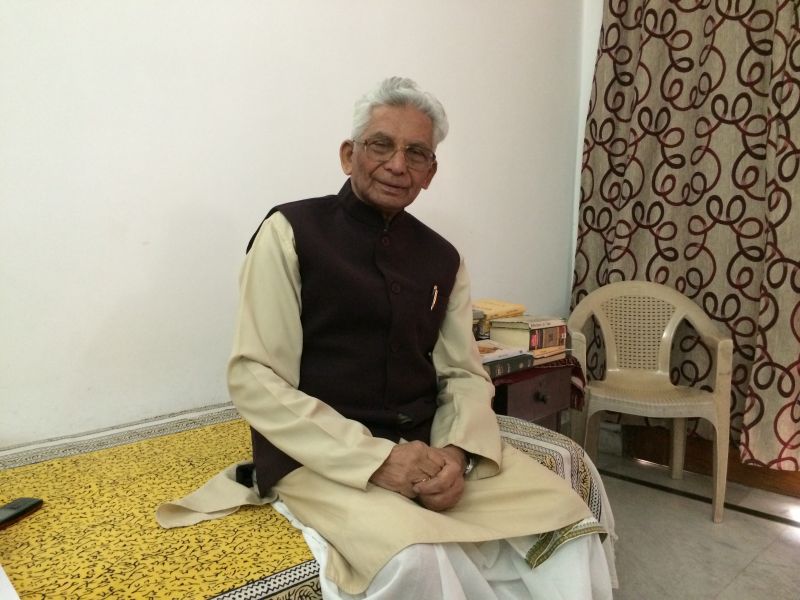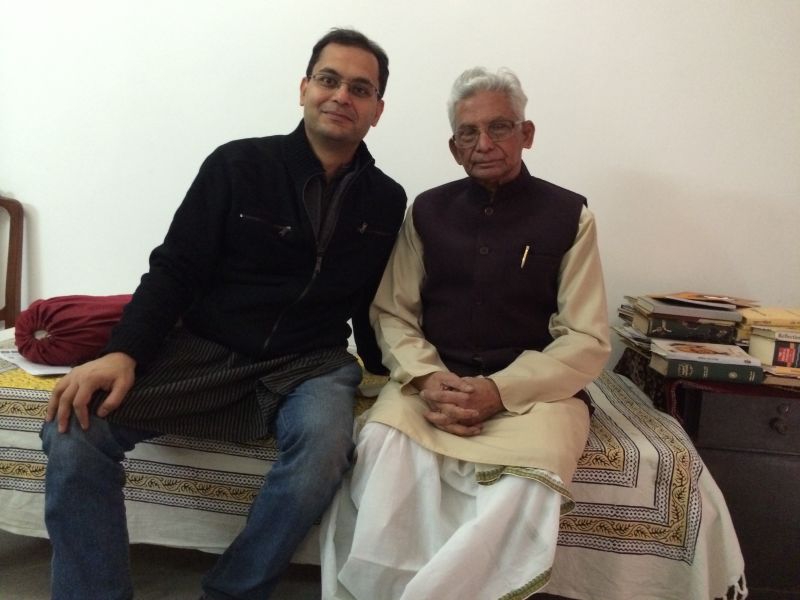A Gift Of Gandhi
Last night, my father had me give a talk on Decision Analysis and Spiritual Growth to a monthly gathering of elders he's been hosting for some years now. He had asked me to talk about how Decision Analysis can be a spiritual path. I enjoyed sharing and had even used Gandhi as an example of a great decision analyst (been reading Ramachandra Guha's biography, 'Gandhi before India' where there are lots of examples of this). His astute analysis of any situation was recognized by his adversaries. There was one man in the audience who was totally quiet. As everyone was leaving, he came up to me and said, "I liked that you spoke of Gandhi. I met him as a teenager and was with him several times." I was stunned that someone who was with Gandhi is still alive and lucidly remembers him, and expressed the hope that I could spend some time with him.
Today, I repeated the wish to see him before I leave tomorrow, and my father made a call to this man, and he agreed to see me. He is the head of a temple in Chittaranjan Park. I went up to his room and he immediately remembered me and what I had spoken of yesterday. He was waiting to share his memories of Gandhi with me. And what a treat to chat with the 85-year old Nrityendranath Sarkar (or Sarkar-uncle)! He was around 16 years old at the time he first saw Gandhi, in 1945. A mentor and close associate of Gandhi told Sarkar-uncle to go get Gandhi's blessings. Gandhi was walking to a prayer meeting. He touched Gandhi's feet, and Gandhi stopped, and looked at him. He asked, "Who is this boy?" Someone introduced the boy, saying, "Your associate has sent him. He had joined the Quit India movement. He has come to see you." The boy himself was tongue-tied. Gandhi asked him, "Do you know Robindro Songeet (Rabindranath Tagore's songs)?" He said, "Yes." Gandhi asked, "Do you know Jodi Tor Daak Shuney Keyo Naa Aashe ("If no one heeds your call, go on alone" - a famous song of Tagore)"? He said, "Yes." Gandhi said, "Come with me. You will sing this in the prayer meeting."

Mr. Sarkar remembers hanging out with Gandhi and being a part of many conversations. Once, there were some leaders who had smoked and perhaps taken alcohol before coming to him. Gandhi looked at them and said very gently, "I want to say something to you. You are free to follow or not follow it. You would be benefited if you gave up smoking and alcohol." He said it with so much love, without making any arguments, that from that day, all the young boys swore never to touch cigarettes or alcohol. To this day, Sarkar uncle told me hasn't touched them.
Another time, in the charged communal environment of 1946, Sarkar uncle remembers hanging out with Gandhi in Beleghata (Kolkata) at the home of a Muslim follower, Goni miya. That home later became Gandhi ashram in Kolkata. In one of those sessions, an angry friend of Sarkar uncle stood in front of Gandhi, making angry comments about Muslims. Gandhi did not get upset. He simply smiled, and this confused the angry boy. Then Gandhi said, "I really like your energy. So much energy is good. Very good." On the topic itself, Gandhi simply said, "We are all just humans." The boy was totally confused and overwhelmed by the love that he felt from Gandhi. He transformed completely and did not espouse hatred for Muslims any more.
When the riots started around the end of 1946, Gandhi came several times, and he would take out a procession where the young boys would join, singing Raghupati Raghav Raja Ram (a spiritual song that was dear to Gandhi). Sarkar uncle remembers one such procession of 20-25 people in which he was the youngest. Even Abha (Gandhi's grand-daughter-in-law) and Manu (Gandhi's granddaughter) were older to him. As they walked straight into the rioters, they stopped, in the middle of the bloodshed, and went into silence. Gandhi's group just kept walking singing God's name, and the rioters stopped their killing!
The story that moved me the most was that during these walks, they found a group of people crowded over a body with multiple stab wounds. The crowd was trying to determine if the man dead was a Hindu or a Muslim. When they saw Gandhi approaching, they asked him the question. Gandhi looked at the man, walked over to his head and bent down. With tears in his eyes, and his hand caressing the dead man's head, he said, "This man is neither Hindu nor Muslim. He is a human. One brother was killed by another brother." No one could speak after that.
Another time on these walks, a jeep with British officers came by them. The officers had sten guns, and they got off the jeep. A curfew was on, which meant the officers could shoot if anyone violated the curfew. The thought that crossed the young boy's mind was, "Are they going to shoot us now?" But the British officers stood in silence and respect as Gandhi led the boys. Sarkar uncle remembers that scene vividly.
History tells us that wherever Gandhi walked in those troubled days, people stopped killing each other. No rational arguments were given. A deeper language was being spoken.

I could feel the vibration of love every time Sarkar uncle remembered Gandhi's "bhavna" as he called it (a largely untranslatable world that is roughly approximated by "feeling" combined with "intention"). Lots of other gems from this interview to be shared when I get a chance. I feel blessed to get this unexpected gift of Gandhi a day before leaving India.
Posted by Somik Raha on Dec 12, 2014
SHARE YOUR REFLECTION
13 Past Reflections


On Dec 12, 2014 Michaele Premet-Rosen wrote:

On Dec 12, 2014 Nipun Mehta wrote:


On Dec 12, 2014 Pancho Ramos Stierle wrote:

On Dec 12, 2014 Madhusudan Agrawal wrote:



On Dec 13, 2014 Abhay Bhushan wrote:

On Dec 13, 2014 mindyjourney wrote:

On Dec 13, 2014 Ajoy k Bhattacharjee wrote:

On Dec 17, 2014 Rahul wrote:



On Dec 12, 2014 Jyoti wrote:
Post Your Reply